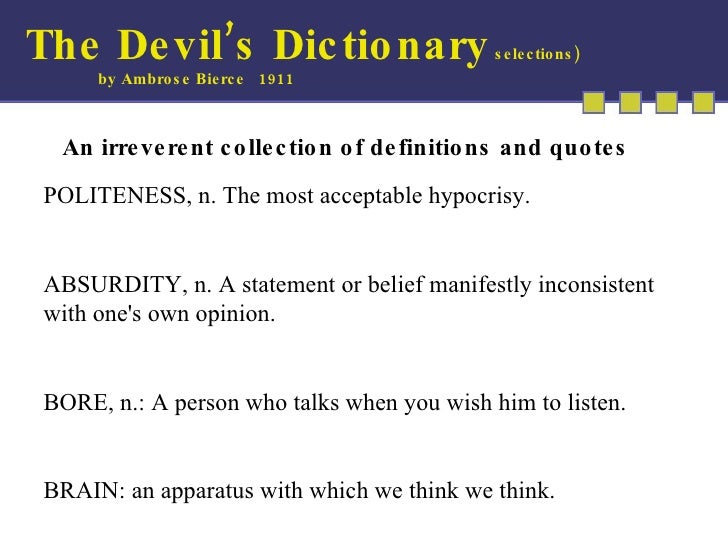Ambrose Bierce (1842-1914), was a friend and rival of Mark Twain and one of nineteenth-century America's most renowned satirists. A Union veteran of the Civil War, he became one of the best-known writers and journalists in the country.
Bierce's book
The Devil's Dictionary was named as one of "The 100 Greatest Masterpieces of American Literature" by the American Revolution Bicentennial Administration.
His story "
An Occurrence at Owl Creek Bridge" has been described as "one of the most famous and frequently anthologized stories in American literature." Author Kurt Vonnegut wrote: "... I consider anybody a twerp who hasn't read the greatest American short story, which is '[An] Occurrence at Owl Creek Bridge,' by Ambrose Bierce. It isn't remotely political. It is a flawless example of American genius, like 'Sophisticated Lady' by Duke Ellington or the Franklin stove."
His
The Unabridged Devil's Dictionary of epigrams, essays, verses, and vignettes targets the religious, the romantic, the political, and the economic, in equal measure.
Acquaintance, n.: A person whom we know well enough to borrow from but not well enough to lend to.
Bride, n.: A woman with a great future behind her.
Consult, v: To seek another's approval of a course already decided on.
Bierce employed a distinctive style of writing, especially in his stories. This style often embraces an abrupt beginning, dark imagery, vague references to time, limited descriptions, the theme of war, and impossible events.
One of the best known things about Bierce is something we don't know - how he died.
In October 1913, Bierce, then age 71, departed from Washington, D.C. for a tour of his old Civil War battlefields. By December he had passed through Louisiana and Texas, crossing by way of El Paso into Mexico, which was in the throes of revolution.
He joined Pancho Villa's army as an observer, and in that role he witnessed the Battle of Tierra Blanca and made it as far as the city of Chihuahua. His last known communication with the world was a [purported] letter he wrote there dated December 26 which ended "As to me, I leave here tomorrow for an unknown destination."
He vanished without a trace, his disappearance becoming one of the most famous in American literary history. An official investigation by U.S. consular officials found nothing.
Bierce's friend and biographer Walter Neale said that Bierce had not ridden horses for quite some time, was suffering from serious asthma, and had been severely critical of Pancho Villa, and so concluded that it would have been highly unlikely for Bierce to have gone to Mexico and joined Villa.
Despite a lack of hard evidence that Bierce had gone to Mexico, there is also none that he had not. Therefore, despite an abundance of theories (including suicide), his end remains a mystery.
The edition of his dictionary shown here is illustrated by
Ralph Steadman. This artist, writer, sculptor, political cartoonist, and designer of labels for vintage wines, is the author/illustrator of the novel
Doodaaa, as well as the illustrator of Lewis Carroll's
Alice, George Orwell's
Animal Farm, and Hunter S Thompson's
Fear and Loathing in Las Vegas.





